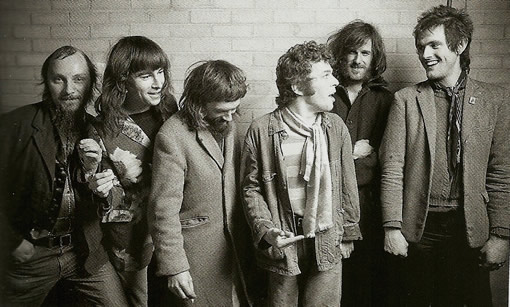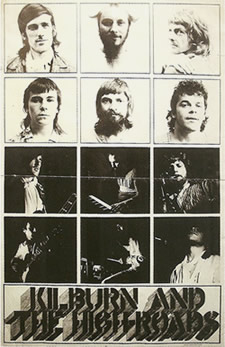SEX AND DRUGS AND ROCK AND ROLL

Photography - Mick Hill
Ian Dury became a superb wordsmith and wonderful showman, but he was a problematical character. Did his disability create the problems, or was it his family? Were the challenges he faced in both departments essential to his creative achievements? These issues and others are well covered in the film, Sex and Drugs and Rock and Roll, and also in Will Birch's new insightful biography of Ian, which also focuses on Charlie's relationship with Ian.
Charlie was the original bass player in Kilburn and the High Roads. The earliest 'rehearsals' took place in a basement in Covent Garden and the band also included George Khan, Terry Day and Russell Hardy. At that point no one gave Ian a bat's chance in hell of getting anywhere with his ambitious ideas for a group, but it was hard to say no. And even as he tore through old classics like Ready Teddy and Tutti Frutti with scant regard for anything normally considered musical, there was an energy and originality there that was undeniable.
Over time that band was fired and then rehired, and rehearsals began again at Wingrave. The vibe of the times spent at Ian and Betty's vicarage in Wingrave has been brilliantly captured in the fabulous film Sex and Drugs and Rock and Roll. Aggression was never far below the surface, but so also was an appreciation of the musical/visual link and Ian's adoration of original rock and roll and jazz heroes.
 A lot of the jazz was free. Very free. Terry and Charlie were both members of the legendary no-limits improvising band, the People Band, which had also attracted the incendiary Davey Payne who soon joined them in the Kilburns. So the building blocks were laid for the eventual funk/free jazz fusions handled so well by the Blockheads. Davey was the only musician to go from the Kilburns to the Blockheads - and back to the People Band, who are still redefining collective improvisation to this day.
A lot of the jazz was free. Very free. Terry and Charlie were both members of the legendary no-limits improvising band, the People Band, which had also attracted the incendiary Davey Payne who soon joined them in the Kilburns. So the building blocks were laid for the eventual funk/free jazz fusions handled so well by the Blockheads. Davey was the only musician to go from the Kilburns to the Blockheads - and back to the People Band, who are still redefining collective improvisation to this day.
This early incarnation of the Kilburns made waves in London, playing at the Tally Ho, the Kensington and sundry college and dance gigs. The band rehearsed constantly in Wingrave and Charlie tried to win Ian over to incorporating some Sly Stone/James Brown-type funk into the rock and roll-orientated Kilburns.
Charlie wrote a couple of numbers with Ian: Billy Bentley - the first of Ian's 'list' songs, was both London-orientated and leaned prophetically towards the funkier end of the musical spectrum. OK Roland was a brilliantly-penned tribute to the great saxophonist Roland Kirk. This was recorded by the Kilburns and Charlie's own version is heard on his album Grooves and Roots.
Eventually, Ian forced Charlie out of the band, giving him the control he craved. But Charlie quickly found a more congenial musical environment in Ronnie Lane's Slim Chance and there were no hard feelings. Charlie, who always stayed in touch with both Terry and Davey, occasionally visited Ian, and supported Ian and the Blockheads at the Kilburn Gaumont State as part of the Hardy Annuals, and appeared on TV playing the string parts for Superman's Big Sister.
See the film! Buy the book! (Ian Dury: The Definitive Biography - Will Birch) Listen to Charlie's own version of OK Roland! But, as Charlie Gillet says, we may not really understand Ian's true significance as a writer and performer for another twenty years!
Download some samples
Ok Roland (Dury, Hart)